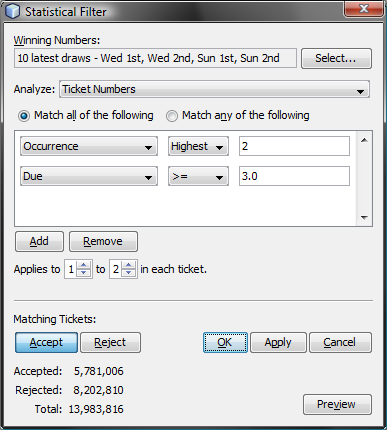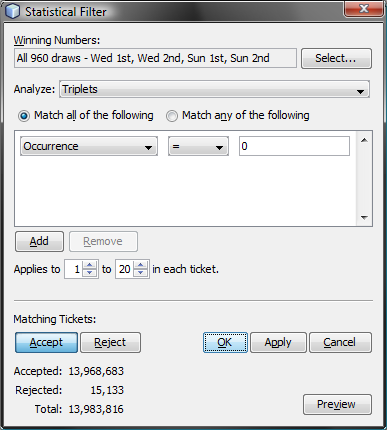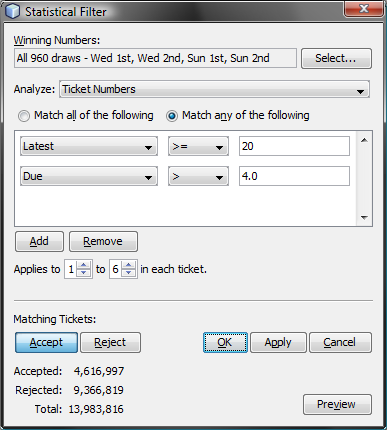
This is a very powerful filter which accepts tickets that have selected statistical properties. Using this filter you can automate some mundane and repeating filtering tasks, e.g. as described here. Several Statistical Filters combined in a Complex Filter can provide a reliable filtering tool to obtain a starting set of tickets as an input for your lottery strategy.
The filter is based on statistical tables in Analyzer window. The filter first calculates the statistics of selected past draws and then accepts only tickets that have desired values in selected column(s) in statistical table.
Note: All examples below are given for Expert Lotto 6/49 Demo Lottery.
To use the filter, first click button Select to choose past
winning numbers draws to calculate draw interval statistics from. In
Analyze combo box select which statistical property the filter
will evaluate. Then select desired statistical table column(s) in the
table below and the required value or value range the accepted tickets must
have. Click Add button to insert additional condition, click Remove button to drop the last condition in the list.
Option Match all of the following makes the filter accept only tickets
that meet all the conditions listed in the table. Option Match any of
the following makes the filter accept tickets that meet at least one of
the listed conditions.
Some statistical properties selected in Analyze combo box add another
filtering option: Applies to X to Y in each ticket. That is because
when filtering e.g. according to statistics of ticket numbers then each
accepted ticket can contain up to 6 numbers that the filter's
statistical condition(s) pull from the whole number pool (in a 6/xx
lottery).
The conditions in Statistical Filter look like this:
StatisticalTableColumnName Operator NumericalValue
Where the StatisticalTableColumnName is one of
See also here.
| Operator | Example | Meaning |
= |
Ticket Numbers: Occurrence = 5 | Select pool numbers that appear exactly 5 times in the selected past draws. |
> |
Triplets: Latest > 4 | Select triplets that haven't hit for more than 4 draws in the selected past draws. |
>= |
Pairs: Occurrence >= 3 | Select pairs that appear 3 or more times in the selected past draws. |
< |
Ticket Numbers: Latest < 3 | Select pool numbers that hit in the very latest draw or in previous draw in the selected past draws. |
<= |
Pairs: Due <= 0.8 | Select pairs that are not likely to hit again in the next draw. |
Highest |
Ticket Numbers: Latest Highest 5 | Select 5 ranks of pool numbers that haven't hit for the longest time in the selected past draws. |
Lowest |
Ticket Numbers: Due Lowest 10 | Select 10 ranks of pool numbers that are least likely to hit in the next draw. |
Note: Operators Highest and Lowest select the best and the worst ranking property values. A rank consists of statistical property values that have the same value in given statistical table column. For example when analyzing 10 latest draws in Expert Lotto 6/49 Demo Lottery then the Latest column in Ticket Numbers table sorted in descending order looks like this:
| Main Number | Latest |
| 5 | 10 |
| 31 | 10 |
| 43 | 10 |
| 38 | 9 |
| 11 | 8 |
| 8 | 8 |
| 26 | 8 |
| 48 | 8 |
| 49 | 8 |
| 20 | 7 |
| 33 | 7 |
| 35 | 7 |
| 30 | 6 |
| 15 | 6 |
| 37 | 6 |
| 32 | 5 |
| 1 | 5 |
| 12 | 5 |
| 24 | 5 |
| more... | more... |
The highest ranking numbers are the ones with Latest value of
10 (5,
31, 43), the second best rank is number 39 with Latest value of 9, the
third best rank are numbers with Latest value of 8 (11, 8, 26, 48, 49)
etc. So filter condition Ticket Numbers: Latest Highest 3 will select
pool numbers with Latest values 10, 9 and 8, the numbers are 5, 31, 43,
38, 11, 8, 26, 48, 49. Filter condition Ticket Numbers: Latest Highest
1 will select pool numbers 5, 31, 43 - not just the the first row of
statistical table sorted in descending order.
Operator Lowest works the same way except that it looks at the lowest
ranking of numbers, i.e. at the bottom of the table above.
With filter settings on the screen shot below the filter
accepts tickets, which contain 1 or 2 numbers that hit most frequently
in the last ten draws AND are long overdue.

With filter settings on the screen shot below the filter
accepts
tickets, which contain at least one triplet that has never been drawn
yet in the whole lottery history.

With filter settings on the screen shot below the filter
accepts
tickets, which contain at least one number that hasn't hit for 20 or
more draws OR at least one number which is long overdue.

The main advantages of Statistical Filter are: